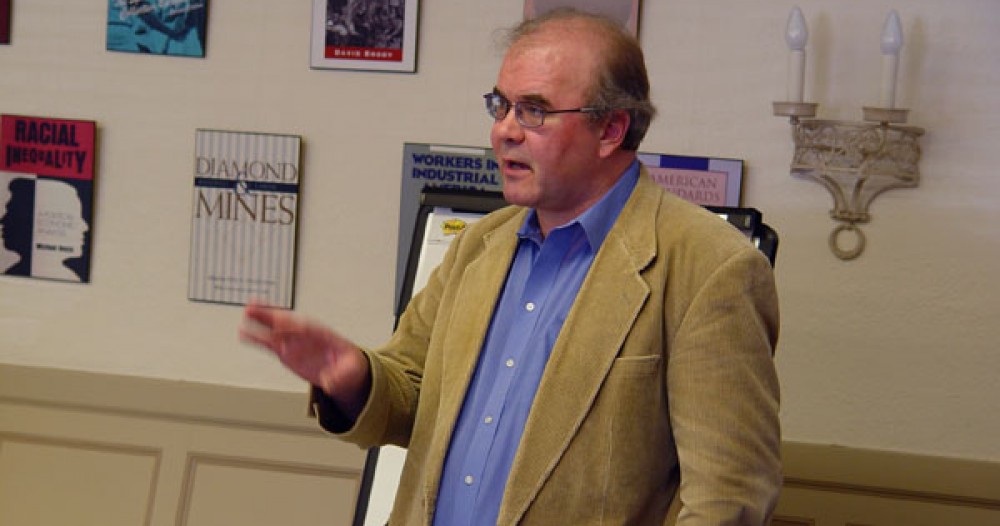This piece appeared originally in the Addison Independent
Our Common Capacity to Love
Not for the first time, I am moved to begin my column with reference to the words of one of my “Ways of Seeing” sisters. In dispensing her “advice that nobody asked for” a couple of weeks ago, Joanna Colwell offered two sentences that spoke pure truth: “Life is short. Act like you know that to be true.”
Life is short. I’ve learned that lesson before. Then I suddenly lost my friend and Middlebury College colleague, Bob Prasch, and I had to learn it again. How could Bob be here one day and gone the next? Everyone I knew was as stunned as I was. Bob and I had chatted in the college library café just a week or two before he died and that was the last time I saw him. Now, of course, I so deeply wish that we had chatted longer. Bob was a great chatter.
Bob was one-of-a-kind. Yes, we are all one-of-a-kind in a certain sense, but Bob was somehow more so. He possessed all of the qualities I admire in a person: a keen intellect, a winning sense of humor, a warm and generous heart with an authentic smile to match. Bob had the ability to stop and be fully present with whomever he was conversing with and that quality of full presence is increasingly rare. His way of being present, however, was rather different than that of my more contemplative practice-oriented friends. Bob could be fully present with you, while simultaneously talking your ear off.
I must confess that sometimes, in conversation with Bob, I had “but I have to go now” running through my head. But mostly, I learned to silence that inner protestation, because listening to Bob was like listening to a brilliant TED talk or a mind-bending lecture from your favorite college professor. And although I, too, am a college professor, when I spent time with Bob, I more often felt like a very lucky student in a one-on-one tutorial. When it mattered, of course, Bob could also really listen. He helped me to think through many a hard decision.
In the days immediately following Bob’s sudden death, I found myself wishing a strange kind of wish. I wished that everyone in Bob’s circle — and all of the college faculty, staff and students who knew and loved him — were all Jews, all Catholics or all Hindus or all something. Then, we would somehow know what to do with our collective shock and our grief. We would sit Shiva, or we would be knit together by the familiar strains of the Funeral Mass, or we would chant together portions of the Vedas and in that chanting we would somehow find our footing. This wasn’t a wish about the actual private ceremony that Bob’s family would choose to create; it wasn’t even a “real” wish. It was an expression of my deep longing for a way that Bob’s vast collection of friends, students and colleagues could draw together as a community.
Well, Thank God (as it were) that we are not “all something,” because that would be boring, stifling or worse. For most of my adult life, I have both studied and celebrated religious pluralism, and I include in that pluralism atheists, agnostics and “spiritual, but not religious” folks of all kinds. Indeed, I can claim for myself any number of these identities on a given day or week, but that’s another column.
Life is short. What to do? Where is the foothold? Is there something we have in common that can collectively ground us in the face of loss — my loss, your loss and, at this vulnerable time, a college’s collective loss? Well, of course, there is something. There is our common capacity for love.
So that’s where I’ve been going in these last few weeks. Going to love. I am seeking community wherever I can find it and oddly enough, that will include a faculty meeting. Or maybe not so odd, for it is through our common love of teaching and learning that so many of us came to love and to cherish Bob Prasch.
I’ve been very intentionally stopping to tell people that I love them — on the phone, in emails, over a coffee. I find it interesting that I often feel the need to preface my words of affection with an apology for sounding mushy or sentimental. Why is that? But mush or no mush, I want people to know that they matter to me, and in what particular ways they do. None of us knows which day will be our last one and in this time of heightened awareness, the words that my friend Helen Nearing once wrote have become a kind of daily refrain: “Love is the source, love is the goal, love is the method of attainment.”
Of course, I know better than to think that I’ll be able to keep up the intensity of this love-fest for long. Our old habits and ways of being tend to return. As the Buddhist writer Jack Kornfield has put it: “After the Ecstasy, the Laundry.” But life is short and in the absence of common rituals to ground us, it is worth remembering how we are all bound together by our capacity to love. Right now, I am stumbling through my ordinary days, keeping in mind how extraordinary love can be. I have many people to thank for that. Right now, I am thanking Bob.
Rebecca Kneale Gould is a shepherd in Monkton, a scholar of religion and Senior Lecturer in Environmental Studies at Middlebury College. She is writing a book entitled Spacious.
